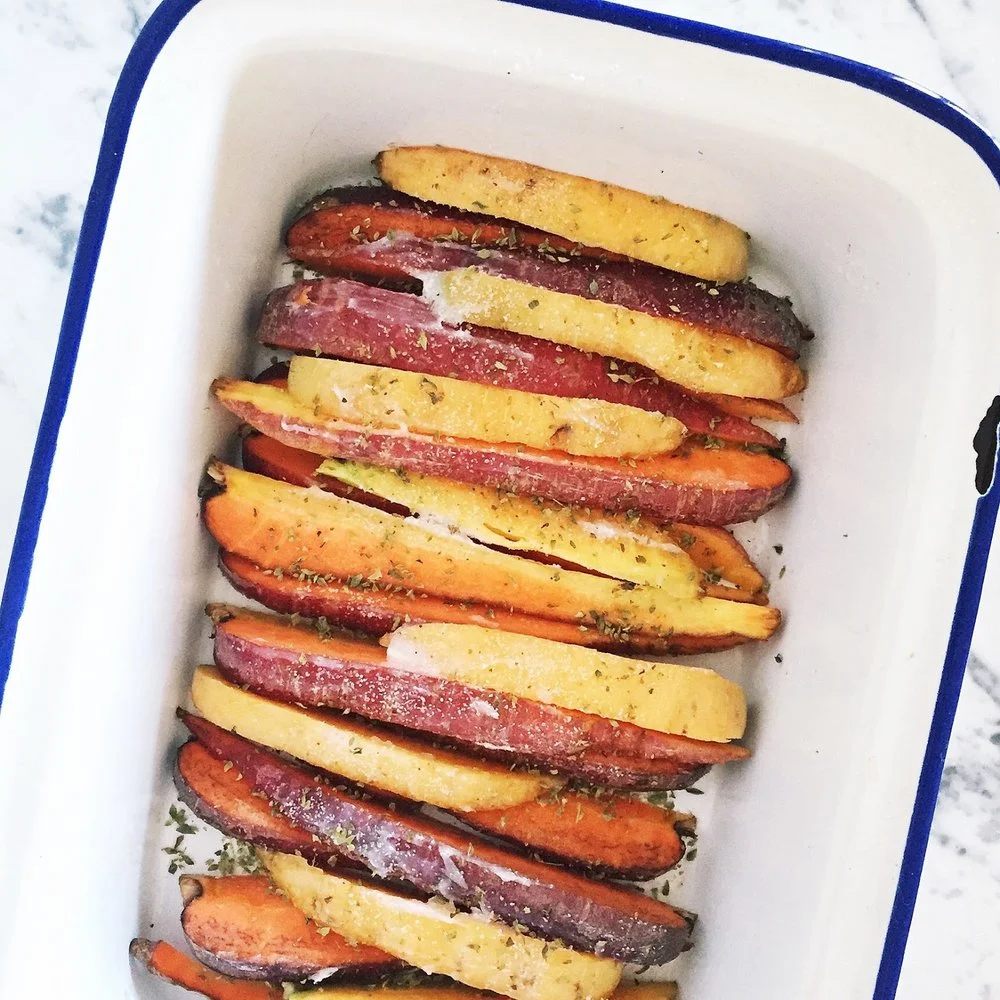In Defense of Fats

Although we're creeping away from Holiday feasts filled with roasting, baking, and cooking, many are just now moseying into the kitchen to reacquaint themselves with cooking and their sense of health. In a world in which dollops and tubs of processed fake spreads such as I Cannot Believe It's Not Butter [I sure can . . .] or hydrogenated vegetable oils are dripping, it's well time to strip down the base of our food—fats. Here is a guide to oils to avoid, oils to use, & when to drizzle them on . . .
To spread nad sizzle your oil of choice on a garden of noshes, consider supporting your local farmers and join a delivery program like From the Farmer. With seasonal produce like heirloom, ombré-hued carrots, this locally-driven program subtracts the effort of seeking, shopping, and schedule so you can enjoy a fresh start to your New Year. Plus! if you use the coupon code thirlby2016, you'll receive 20 percent off of your first fourfarm-to-front door deliveries! Once you receive your bagful of bounty, roast any vegetables with coconut, MCT, or avocado oil at 425 degrees with a sprinkle of sea salt + herbs like oregano or thyme!
Oils to Avoid
Canola Oil | Corn Oil | Soybean Oil | Peanut Oil | Sunflower Oil
Safflower Oil | Cottonseed Oil | Grapeseed Oil | Margarine
Shortening | I Can’t Believe It's Not Butter | Smart Balance
Any fake butter or vegetable oils products
Imbalanced Omega Profile
This list is essentially all vegetable oils that are extremely toxic for our bodies. Vegetable oils contain a very high concentration of Omega 6 fatty acids and polyunsaturated fats that cause imbalances. An unbalanced ratio of healthy Omega-3 and unhealthy Omega-6 fats can cause disease in the body, ranging from inflammation to cancer.
Chemicals
These vegetable oils are also fraught with pesticide residue + chemicals that are used in the production of the often genetically modified vegetables, such as soy or corn [hello, Monsanto!]. They are overheated, over-processed, oxidised, + chemically-deodorised toxins . . . The chemical processing of these oils also lace them with chemicals such as BHA [Butylated hydroxyanisole] + BHT [Butylated hydroxytoluene] that are not only hard to pronounce but also hard for our bodies to process to say the very least—they have been linked to organ damage, immune dysfunction, infertility, high cholesterol, + even behavioural problems.
Anti-oxidant Depletion
Also, due to their low oxidation point, vegetable oils rid the body of its precious antioxidants that are used in attempt to neutralize the oxidative effect these oils cause. When consumed regularly, they can consequently deplete the body of essential minerals + vitamins, such as Vitamin E.
Reproductive health and hormones
Most importantly, vegetable oils are highly detrimental to the reproductive system + infant development. They can potentially cause birth defects, abnormalities, + hormone imbalances in both women and men. This is because hormone production depends on fats as a vehicle. When the cells are oxidized with the regular consumption of these oils, the new cells that are generated could potentially mutate. These mutated fat cells then become damaged carriers that halt healthy hormone production.
Oils to Use
Coconut Oil | Butter | G h e e | Olive Oil | Avocado Oil
Coconut Oil
Yes, believe the hilarious hype about the magical miracle that is coconut oil. You might not be able to 'see into three galaxies away to a planet named Gå4n,' but your body will surely be nourished enough to reproduce a generation that might be able to do so. This oil is composed of Medium Chain Fatty Acids + Lauric Acid that can charge your cells to provide you with sustained + stable energy throughout the day. It's also highly beneficial for the reproductive system since the fat cells in our bodies are predominantly composed of saturated fats for which coconut oil is an excellent source. Not to mention it's great to slather on as a moisturiser from your lips to your toes . . .
Butter & ghee
I was so sad to see butter get such a beating over the years + glad to see it have the comeback that it deserves. When it is sourced from pastured grass-fed cows, butter not only tastes exponentially better but is a phenomenal source of fat-soluble vitamins + saturated fats. It also contains a compound identified by Weston A. Price as Activator X that has preventative effects against disease.
Olive Oil
A staple of my Mediterranean family's diet—one of my uncles even takes shots of it in the morning—this oil is pure gold. When it is of a high-quality source, its colour will almost be reminiscent of deep dish detergent green + taste of pure, earthy olives. It's high in monounsaturated fats, which make it great for cold recipes but unsuitable for cooking since monounsaturated fats oxidise when heated.
Avocado Oil
Like olive oil, avocado oil should only be used in cold recipes such as in salads or to dress cooked + cooled vegetables [perfect of green beans with a dash of Maldon salt!] It has a creamy flavour and is therefore perfect to make dressings with [I love it with some stone-ground organic dijon mustard, fresh black pepper, a dash of cumin, + raw apple cider vinegar]. This is also another oil I love applying on my skin for its deeply hydrating qualities.


